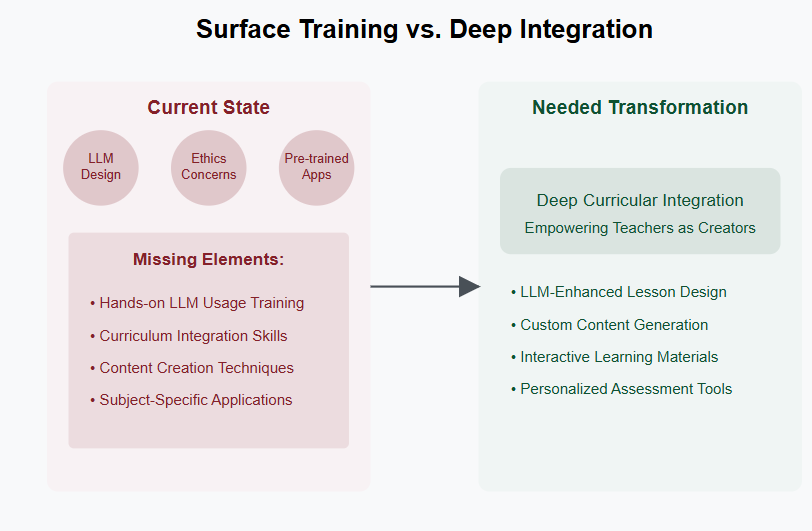Is the "AI Fever" Really Breaking?
The EdWeek AI Survey: Two Competing Interpretations
🎉 Big News: The Wait Is Over! 🎉
AI in Education: A Roadmap for Teacher-led Transformation has arrived in paperback, bringing practical AI guidance right to your fingertips. Transform your team's response to AI:
📚 Order your team's set of paperbacks and unlock:
20% off our signature virtual literacy course, custom-designed to complement the book's framework
Hands-on strategies for AI integration
Step-by-step implementation guides
🎁 As a special holiday treat for all my readers, please enjoy this exclusive recording of my recent webinar "Empowering Educators to Shape AI in Education."
Ready to empower your team? Get your copies and course access today!
Thank you for your continued support of Educating AI!!! Please consider becoming a paid subscriber.
Take advantage of the yearly rate discount. $50 at year = $4.16 per month.
Two Kinds of AI Literacy
As I wrap up for the holiday break (amid podcast recordings and AI trainings), I've been thinking about Lauraine Langreo's recent Education Week piece, "'We're at a Disadvantage,' and Other Teacher Sentiments on AI." What caught my eye was Dan Meyer's take on it. Meyer, a prominent ed-tech critic, sees the data showing flat AI usage despite increased training as evidence that the "AI fever" in education is breaking.
But the numbers tell a different story. Two years after ChatGPT's release, 58% of teachers still lack any AI training. When training does happen, it's usually a one-off session - only 6% receive ongoing support. Meanwhile, students forge ahead with these tools. As one Pennsylvania special education teacher noted: "As a special ed teacher who has to help students across 20+ curriculums... I frequently ask [ChatGPT] for background on pieces of literature, summaries of historical events."
The data doesn't reveal AI's limitations - it exposes our failure to properly support teachers.
The Core Data Points
From Education Week's October 2024 survey:
43% of teachers received AI training (up from 29% in spring)
58% still have no AI training
Usage rates remain flat: 32% using AI vs 31% in December 2023
Dan Meyer's Critical Reading
Meyer zeros in on a striking paradox in the data: "there has been a 50% increase in teachers getting AI training since December, all while AI usage has remained flat, all while the models have improved, all while more states and districts have crafted AI policies."
His interpretation focuses on teacher resistance as reasoned rejection rather than implementation failure. As he notes: "Only one reason for not using AI INCREASED: 'I don't think the technology is applicable to my subject matter or grade.'"
Meyer concludes this indicates "this fever will break" and sees it as an opportunity for edtech to "get back to making tools that DO feel applicable to teachers and learners."
A Different Reading: The Growing Digital Divide
The article provides compelling evidence for a more concerning interpretation:
Teacher Disconnection Direct quote from the article: "I would really like to have some in-depth training on the use of some of the new educational AI tools," said a high school math teacher in Colorado. "Our district has not provided anything at all and it is too expensive to pursue on my own."
Competing Priorities The article notes a high school social studies teacher in Ohio wants to learn more about AI but their district is focused on the "science of reading." Their stark assessment: "I feel that we are at a disadvantage."
Limited Current Usage When teachers do use AI, the article shows it's primarily for basic tasks. A Maine middle school science teacher reports "using AI to assist me in creating goal setting for my academic advising." While valuable, this represents a fraction of AI's potential.
Why Meyer's Reading Misses Critical Context
Meyer interprets flat usage despite increased training as evidence of AI's limited utility. However, this overlooks:
The Quality of Training: The article notes 24% received just one session, with only 6% getting ongoing support. This suggests the "50% increase" in training may represent shallow exposure rather than meaningful professional development.
Student Adoption Reality: While Meyer celebrates declining interest as natural, he overlooks that students continue adopting these tools independently. As the EdWeek data shows, teachers' top reason for non-use is "lack of knowledge" - not reasoned rejection.
Implementation vs Inherent Value: The increasing sentiment that AI isn't "applicable" to certain subjects may reflect inadequate subject-specific training rather than actual limitations. Without targeted, discipline-specific training that demonstrates concrete applications within math, science, language arts and other subjects, teachers understandably struggle to see AI's relevance to their daily practice.
Moving Forward: From Digital Divide to Digital Bridge
The EdWeek data reveals not AI's limitations but a growing crisis: while students forge ahead with AI adoption, many teachers remain unsupported and uncertain. Meyer's "breaking fever" narrative misreads teacher hesitation as reasoned rejection rather than what the data actually shows - systemic failure in professional development.
As the Pennsylvania special education teacher demonstrated, meaningful support leads to valuable applications. The path forward requires immediate action on three fronts:
1. Sustained Learning Communities
Replace one-off sessions with ongoing professional development
Create subject-specific pathways guided by early adopters
Build training around real classroom scenarios students already face
2. Bridge the Digital Divide
Study and respond to current student AI usage patterns
Create shared exploration spaces for teachers and students
Develop practical AI literacy frameworks across subjects
3. Remove Systemic Barriers
Integrate AI training into existing professional development structures
Share resources and best practices across districts
Create policies that encourage rather than restrict thoughtful integration
The "fever" isn't breaking - we're watching a digital literacy gap widen while celebrating teacher disconnection as vindication. The question isn't whether AI belongs in education - students have already answered that. The question is whether we'll help teachers guide this transformation or leave them, and ultimately their students, to navigate it alone.
Nick Potkalitsky, Ph.D.
Transform Your School's AI Culture
Immersive. Collaborative. Reflective.
Educating AI is a reader-supported publication. To receive new posts and support my work, consider becoming a free or paid subscriber.
Subscribed
Two Pathways to AI Excellence:
Foundational AI for Educators
Essential classroom tools
Immediate application
Advanced AI Differentiation
Master personalized instruction
Lead your school's transformation
School Package: Enroll your team, get a free AI workshop
Free strategy sessions & implementation support available.
Transform your school's AI readiness: nicolas@pragmaticaisolutions.net
Check out some of my favorite Substacks:
Mike Kentz’s AI EduPathways: Insights from one of our most insightful, creative, and eloquent AI educators in the business!!!
Terry Underwood’s Learning to Read, Reading to Learn: The most penetrating investigation of the intersections between compositional theory, literacy studies, and AI on the internet!!!
Suzi’s When Life Gives You AI: An cutting-edge exploration of the intersection among computer science, neuroscience, and philosophy
Alejandro Piad Morffis’s Mostly Harmless Ideas: Unmatched investigations into coding, machine learning, computational theory, and practical AI applications
Amrita Roy’s The Pragmatic Optimist: My favorite Substack that focuses on economics and market trends.
Michael Woudenberg’s Polymathic Being: Polymathic wisdom brought to you every Sunday morning with your first cup of coffee
Rob Nelson’s AI Log: Incredibly deep and insightful essay about AI’s impact on higher ed, society, and culture.
Michael Spencer’s AI Supremacy: The most comprehensive and current analysis of AI news and trends, featuring numerous intriguing guest posts
Daniel Bashir’s The Gradient Podcast: The top interviews with leading AI experts, researchers, developers, and linguists.
Daniel Nest’s Why Try AI?: The most amazing updates on AI tools and techniques
Riccardo Vocca’s The Intelligent Friend: An intriguing examination of the diverse ways AI is transforming our lives and the world around us.
Jason Gulya’s The AI Edventure: An important exploration of cutting edge innovations in AI-responsive curriculum and pedagogy.










For what it is worth, I think what you call teacher disconnection is the key. We have all been disappointed in the personalized tutorbot approach to applying generative AI to education. Until we see products that use AI to solve educational problems, it is impossible to meaningfully train anyone.